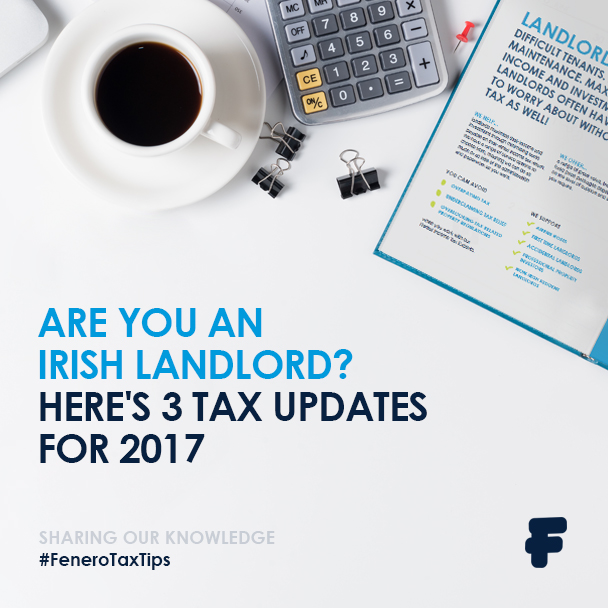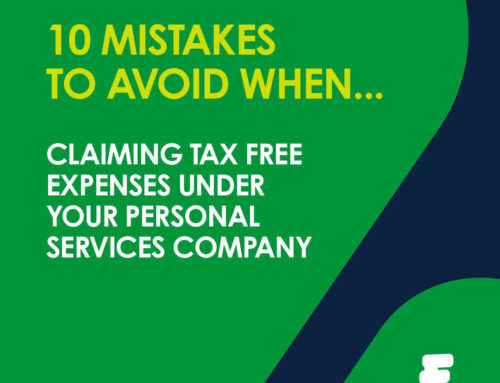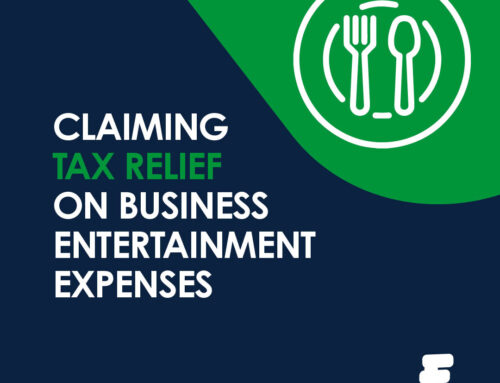Are you up to date with the tax reliefs available for Irish landlords? To help out we’ve summarised a few changes for 2017.
Step 1: Increased value of Rent a Room Relief – Up to €14,000 Tax Free Income
If you rent a room in your home to a third party you may be exempt from paying tax on the income you receive. From 1 January 2017 the tax free threshold has been increased to €14,000. This means you can earn up to €14,000 from renting a room in your home without paying any tax on that income.
The €14,000 threshold includes any amounts your tenant/lodger may pay you for food and utilities such as laundry, as well as the room rental itself.
This scheme does not apply if you are renting the room to short term guests. Therefore lettings such as Airbnb are excluded. Lettings to students for the academic year however are eligible and with the new college year starting again and a students struggling to find accommodation, now could be a great time to earn some extra income tax free.
Step 2 : Expenses to reduce your Tax Bill
For renting out a house and not just availing of the Rent a Room Relief scheme, you must pay tax on the “profits” you make. Profit is the amount which is left from the income paid by your tenants, after you have deducted expenses which are allowed for tax relief.
Here is list of the most common expenses which can be deducted to reduce your taxable profit figure:
- The cost of registering the tenancies with the PRTB; which all landlords are legally required to do
- Interest payable on your mortgage
- Management agency fees
- Letting agency fees
- House Insurance
- Repairs and maintenance, although the landlord cannot claim a deduction for their own labour
- Legal/Accounting fees including the cost of your annual rental income tax return
- Local Service charges such as waste collection and water rates
- Furniture costs are deductible although you do not receive the full tax relief in one year; instead it is spread out over a number of years
- The Non-Principle Private Resident charge (NPPR) which applied annually to individuals who owned a second home from 2009 to 2013 is now allowed as a deductible expense following a high court ruling in early 2017. But the Local Property Tax (LPT) which was introduced in 2013 and levied on all residential properties in the Ireland, is still not deductible against rental income.
Step 3: Increased Mortgage Interest Deduction
One of the biggest expense deductions for most landlords is mortgage interest. You are entitled to treat a portion of your mortgage interest payments as an expense to reduce your tax bill. Between 2009 and 2016 only 75% of the mortgage interest could be treated as an expense. From 1 January 2017 this has increased to 80%.
You must register your rental property with the PRTB in order to claim mortgage interest expenses. You must keep your PRTB registration up to date. Some landlords can get a nasty surprise during a Revenue Audit if they have claimed mortgage interest as an expense, but have accidentally forgotten to keep up their PRTB registration – easily done, but a very expensive mistake if it happens. Revenue will recalculate your tax bill to ignore the mortgage interest amount, resulting in you being required to pay additional tax as well as the possibility of interest and penalties on top.
Also connected with your mortgage is TRS. This is a tax relief available to some homeowners on their mortgage repayments. You cannot claim TRS when renting out your property and must contact Revenue to ensure they stop the TRS being paid into your mortgage account. If you don’t do this unfortunately you might find yourself hit with a large bill to repay the TRS when Revenue realise you have received it in error.
Fenero are experts in rental income tax returns.
We will help you minimise your tax bill and ensure you are aware of all the fiddly things which could catch you out in a Revenue Audit.
If you are a landlord and need tax advice or help with your income tax returns, get in touch! The cost of our service is allowable as an expense to reduce your tax bill too!







